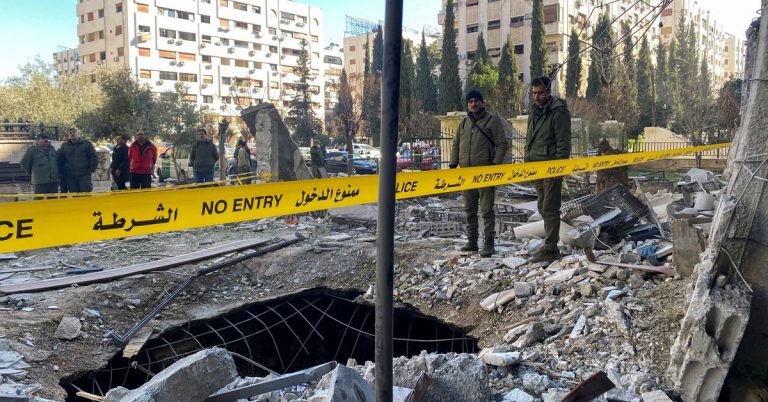AMMAN (Reuters) – Early Sunday, an Israeli missile hit a building in the Kafr Souseh district of central Damascus near a large, heavily guarded security compound near Iranian facilities, killing five people, witnesses and officials said.
The rare and targeted raid damaged several buildings in the densely populated neighborhood near Umayyad Square in the heart of the capital, where there are multi-storey security buildings within residential areas.
A police official told state media that there were a number of dead and wounded.
An Israeli army spokesman declined to comment.
State media, quoting a military source, said that Israel carried out air strikes targeting several areas in the capital shortly after midnight, killing five, wounding 15 civilians and damaging several residential buildings.
“It caused damage to several civilian homes, and material damage to a number of Damascus neighborhoods and its surroundings,” the army said in a statement.
Latest updates
View 2 more stories
It was not immediately clear whether the strike targeted a specific person.
Imad Mughniyeh, the supreme commander of the pro-Iranian Hezbollah, was killed in 2008 in a bombing in Kafr Souseh, a closely watched area where residents say many of Iran’s security services are located, including a major cultural centre.
For nearly a decade, Israel has been conducting air strikes against suspected Iranian-sponsored arms transfers and personnel deployments to neighboring Syria. Israeli officials rarely acknowledged responsibility for specific operations.
Western intelligence sources said Iran has expanded its military presence in Syria in recent years and has a foothold in most areas controlled by the state, with thousands of members of local militias and paramilitary groups under its command.
In recent months, Israel has also intensified its strikes on Syrian airports and air bases to disrupt Iran’s increasing use of air supply lines to deliver weapons to its allies in Syria and Lebanon, including the Iranian-backed Lebanese Hezbollah.
Israeli military experts say the strikes are part of an escalation of what had been a low-intensity conflict aimed at slowing Iran’s growing entrenchment in Syria.
Iran’s proxy militias, led by Lebanon’s Hezbollah, now control vast areas in eastern, south and northwest Syria and in several suburbs around the capital.
Syrian President Bashar al-Assad’s government has never publicly acknowledged that Iranian forces are working on his behalf in the Syrian civil war, saying Tehran has only military advisers on the ground.
(Report by Suleiman Al-Khalidi). Additional coverage of Ari Rabinowitz in Jerusalem. Editing by Daniel Wallis and Jonathan Otis
Our Standards: The Thomson Reuters Trust Principles.

